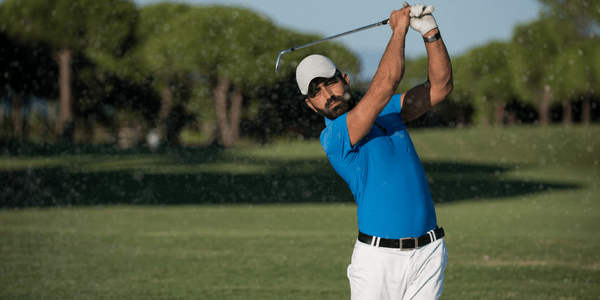
How to Stop Judging Your Performance During Rounds
Distractions are all around on the golf course. But what about your own internal distractions?
Your mind is bombarded throughout a round with distractions, making golf one of the most mentally difficult sports.
Let’s talk about one big distraction that is neglected…
Thinking about how well you are playing…
You may ask, “How could playing well be a distraction?”
The distraction is not about playing well… The distraction occurs when you THINK (or think too much) about how well you are playing.
It’s easy to jerk yourself out of the zone when you deem you’re playing well or better than expected.
Let’s clarify this scenario by examining its opposite… Not playing well.
When a golfer is having a horrible round, their mind starts dwelling on all their bad shots.
These golfers try to figure out what is going wrong, so they analyze every aspect of their performance, dissect their swings, re-evaluate the course and second-guess each shot.
With so many interfering thoughts, it’s no wonder that these golfers find it difficult to get back on track.
Now, let’s look at the converse… Playing well.
Some golfers fall into the, “Why am I playing so well?” trap.
Instead of just continuing to play the game, these golfers will start THINKING about what is going right.
So, they analyze and think about why they are swinging the club so well…
Suddenly, that comfortable swing becomes a bit tighter and more mechanical, shots aren’t dropping like they did earlier in the round, strokes are adding up and now second-guessing creeps into their mind.
The distraction is NOT playing well… The distraction is OVERTHINKING or why you are playing so well.
Moving from PLAYING mind to a THINKING mind will always cause performance to deteriorate.
When you are immersed in just PLAYING or DOING, you can swing the club freely without conscious thought.
When you over think your swing, this creates enough tension to alter your swing and knock you off of your game.
Staying out of the “thinking trap” has been a central theme for PGA newcomer Cameron Champ.
Champ is 23 years-old and leads the PGA Tour this season in driving distance at 335 yards.
Champ’s 129 mph swing speed, 190 mph ball speed and distance off the tee have been noticed by the media and many golfers on the Tour.
Despite the extra attention, Champ is focused on improving his game and not allowing the positive attention to become a distraction.
CHAMP: “I’ve definitely noticed the attention, but I try to just ignore that kind of stuff. I just try to focus on what I’m doing. Obviously, everyone likes to talk about my distance, so I think that’s one thing I’ve really blocked out. Just try to focus on other aspects of my game, just my game in general, and I feel like I’ve handled that pretty well so far.”
Thinking too much on the course is every golfer’s enemy. There is a time and place for everything.
To get the most out of your golf game requires more doing–trusting what you have–and less thinking.
Let Go of Judging Your Performance
Stop focusing on your score every hole. Think about birdie chances and hitting fairways and greens–one hole at a time.
Milk it. When you are playing well, don’t stop to consider why. Keep focusing on birdie chances instead.
Challenge yourself to finish strong on the last few holes instead of protecting your score and playing it safe.
Related Golf Psychology Articles
- How to Manage Pressure in Your Golf Game
- How to Manage Distractions on the Course
- Scheffler’s ‘What’s Next’ Approach
- Subscribe to The Golf Psychology Podcast on iTunes
- Subscribe to The Golf Psychology Podcast on Spotify
Golfer’s Mental Edge 2.0

Do you suffer from fragile self-confidence after missed hitting shots or making mistakes, playing with strict or high expectations that undermine confidence, or the inability to play freely and relaxed on the course?
Successful golfers have learned how to perform with ultimate confidence in competition, so we’ve developed The Golfer’s Mental Edge 2.0 Workbook and Audio program to help you do this!
The Golfer’s Mental Edge 2.0 program includes the top 11 mental training sessions I do with my personal students to help them boost their mental game and improve consistency on the course!